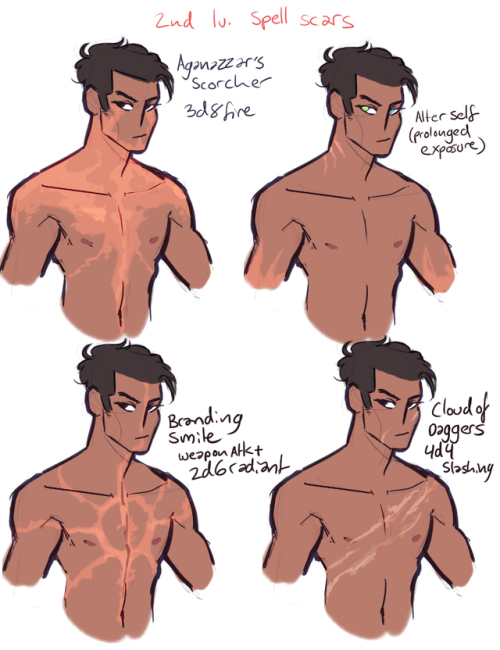Wow This Is So Imaginative!!
Wow this is so imaginative!!






level 2 spell scars :) have fun when you suffer
(Cantrip scars)
(1st level spell scars)
More Posts from Libraryofalexandira11 and Others
This seems helpful. Reblogging so I remember








A guide to designing wheelchair using characters!
I hope this helps anyone who's trying to design their oc using a wheelchair, it's not a complete guide but I tried my best! deffo do more research if you're writing them as a character
Reblogging so I remember. This seems super help for art. Been wanting try my hand at battle pose art rather reference poses but haven’t found much luck in finding good reference poses
You know what’s some crazy $hit?
This fabulous bitch

She makes a shit ton of poses (like 16,000 or some crazy nonsense). I used this lovely lady to draw so much as a teen. Whether it was some nerdy pose for my Mary Sue as fuck OCs

or for full on fight sequences

or for tragic deaths of my OCs in the arms of a totally OOC main protagonist.

this bitch hooked me up.
And with the wildest, craziest stuff that you could see in your head but had no way or resources to reasonably draw like

or this

or this

DUDE! INASNE SHIT!! So I was using her for a pose reference and decided, you know what, I owe this bitch some cash. Lemme dole it out for her. BUT then, I looked and saw she only has 286 fucking patrons!! This chick gives out free shit and spends countless hours arranging these shoots and setting this stuff up.
I’ll fork up the cash, SenshiStock. You’re worth it.
Check out this amazing woman’s stuff, and get knowledged: https://www.deviantart.com/senshistock
Wow that’s so pretty!!! : o




Art by Sasha Vinogradova
Rebloggung to remember this for character analysis and writing purposes. Excellent break down and structure.
C-PTSD: So what is it, anyway?
original post found on Out of the Fog content warning: discussion of trauma, abuse, personality disorders, depression
DISCLAIMER: if you believe the following description of C-PTSD describes you, seek professional help immediately. C-PTSD, left untreated, is a serious disorder with the potential to cause long-term psychological, physical and interpersonal damage.
I reposted this information from Out of the Fog, not as a health professional, but as an abuse survivor who wants to empower other survivors.
Complex Post-Traumatic Stress Disorder (C-PTSD) is a psychological injury that results from prolonged exposure to social or interpersonal trauma, disempowerment, captivity or entrapment, with lack or loss of a viable escape route for the victim… such as in cases of:
domestic emotional, physical or sexual abuse
childhood emotional, physical or sexual abuse
entrapment or kidnapping.
slavery or enforced labor.
long term imprisonment and torture
repeated violations of personal boundaries.
long-term objectification.
exposure to gaslighting & false accusations
long-term exposure to inconsistent, push-pull,splitting or alternating raging & hooveringbehaviors.
long-term taking care of mentally ill or chronically sick family members.
long term exposure to crisis conditions.
When people have been trapped in a situation over which they had little or no control at the beginning, middle or end, they can carry an intense sense of dread even after that situation is removed. This is because they know how bad things can possibly be. And they know that it could possibly happen again. And they know that if it ever does happen again, it might be worse than before.
The degree of C-PTSD trauma cannot be defined purely in terms of the trauma that a person has experienced. It is important to understand that each person is different and has a different tolerance level to trauma. Therefore, what one person may be able to shake off, another person may not. Therefore more or less exposure to trauma does not necessarily make the C-PTSD any more or less severe.
C-PTSD sufferers may “stuff” or suppress their emotional reaction to traumatic events without resolution either because they believe each event by itself doesn’t seem like such a big deal or because they see no satisfactory resolution opportunity available to them. This suppression of “emotional baggage” can continue for a long time either until a “last straw” event occurs, or a safer emotional environment emerges and the damn begins to break.
The “Complex” in Complex Post Traumatic Disorder describes how one layer after another of trauma can interact with one another. Sometimes, it is mistakenly assumed that the most recent traumatic event in a person’s life is the one that brought them to their knees. However, just addressing that single most-recent event may possibly be an invalidating experience for the C-PTSD sufferer. Therefore, it is important to recognize that those who suffer from C-PTSD may be experiencing feelings from all their traumatic exposure, even as they try to address the most recent traumatic event.
This is what differentiates C-PTSD from the classic PTSD diagnosis - which typically describes an emotional response to a single or to a discrete number of traumatic events.
Difference between C-PTSD & PTSD
Although similar, Complex Post Traumatic Stress Disorder (C-PTSD) differs slightly from the more commonly understood & diagnosed condition Post Traumatic Stress Disorder (PTSD) in causes and symptoms.
C-PTSD results more from chronic repetitive stress from which there is little chance of escape. PTSD can result from single events, or short term exposure to extreme stress or trauma.
Therefore a soldier returning from intense battle may be likely to show PTSD symptoms, but a kidnapped prisoner of war who was held for several years may show additional symptoms of C-PTSD.
Similarly, a child who witnesses a friend’s death in an accident may exhibit some symptoms of PTSD but a child who grows up in an abusive home may exhibit the additional C-PTSD characteristics shown below.
What it Feels Like:
People who suffer from C-PTSD may feel un-centered and shaky, as if they are likely to have an embarrassing emotional breakdown or burst into tears at any moment. They may feel unloved - or that nothing they can accomplish is ever going to be “good enough” for others.
People who suffer from C-PTSD may feel compelled to get away from others and be by themselves, so that no-one will witness what may come next. They may feel afraid to form close friendships to prevent possible loss should another catastrophe strike.
People who suffer from C-PTSD may feel that everything is just about to go “out the window” and that they will not be able to handle even the simplest task. They may be too distracted by what is going on at home to focus on being successful at school or in the workplace.
Characteristics
How it can manifest in the victim(s) over time:
Rage turned inward: Eating disorders. Depression. Substance Abuse / Alcoholism. Truancy. Dropping out. Promiscuity. Co-dependence. Doormat syndrome (choosing poor partners, trying to please someone who can never be pleased, trying to resolve the primal relationship) Rage turned outward: Theft. Destruction of property. Violence. Becoming a control freak. Other: Learned hyper vigilance. Clouded perception or blinders about others (especially romantic partners) Seeks positions of power and / or control: choosing occupations or recreational outlets which may put oneself in physical danger. Or choosing to become a “fixer” - Therapist, Mediator, etc.
Avoidance - The practice of withdrawing from relationships with other people as a defensive measure to reduce the risk of rejection, accountability, criticism or exposure.
Blaming - The practice of identifying a person or people responsible for creating a problem, rather than identifying ways of dealing with the problem.
Catastrophizing - The habit of automatically assuming a “worst case scenario” and inappropriately characterizing minor or moderate problems or issues as catastrophic events.
“Control-Me” Syndrome - This describes a tendency which some people have to foster relationships with people who have a controlling narcissistic, antisocial or “acting-out” nature.
Denial - Believing or imagining that some painful or traumatic circumstance, event or memory does not exist or did not happen.
Dependency - An inappropriate and chronic reliance by an adult individual on another individual for their health, subsistence, decision making or personal and emotional well-being.
Depression (Non-PD) -Depression is when you feel sadder than your circumstances dictate, for longer than your circumstances last, but still can’t seem to break out of it.
Escape To Fantasy - Taking an imaginary excursion to a happier, more hopeful place.
Fear of Abandonment - An irrational belief that one is imminent danger of being personally rejected, discarded or replaced.
Hyper Vigilance - Maintaining an unhealthy level of interest in the behaviors, comments, thoughts and interests of others.
Identity Disturbance - A psychological term used to describe a distorted or inconsistent self-view
Learned Helplessness- Learned helplessness is when a person begins to believe that they have no control over a situation, even when they do.
Low Self-Esteem - A common name for a negatively-distorted self-view which is inconsistent with reality.
Panic Attacks - Short intense episodes of fear or anxiety, often accompanied by physical symptoms, such as hyperventilating, shaking, sweating and chills.
Perfectionism - The maladaptive practice of holding oneself or others to an unrealistic, unattainable or unsustainable standard of organization, order, or accomplishment in one particular area of living, while sometimes neglecting common standards of organization, order or accomplishment in other areas of living.
Selective Memory and Selective Amnesia - The use of memory, or a lack of memory, which is selective to the point of reinforcing a bias, belief or desired outcome.
Self-Loathing - An extreme hatred of one’s own self, actions or one’s ethnic or demographic background.
Tunnel Vision - A tendency to focus on a single concern, while neglecting or ignoring other important priorities.
Treatment
Little has been done in clinical studies of treatment of C-PTSD. However, in general the following is recommended:
Removal of and protection from the source of the trauma and/or abuse.
Acknowledgement of the trauma as real, important and undeserved.
Acknowledge that the trauma came from something that was stronger than the victim and therefore could not be avoided.
Acknowledgement of the “complex” nature of C-PTSD - that responses to earlier traumas may have led to decisions that brought on additional, undeserved trauma.
Acknowledgement that recovery from the trauma is not trivial and will require significant time and effort.
Separation of residual problems into those that the victim can resolve (such as personal improvement goals) and those that the victim cannot resolve (such as the behavior of a disordered family member)
Mourning for what has been lost and cannot be recovered.
Identification of what has been lost and can be recovered.
Program of recovery with focus on what can be improved in an individual’s life that is under their own control.
Placement in a supportive environment where the victim can discover they are not alone and can receive validation for their successes and support through their struggles.
As necessary, personal therapy to promote self-discovery.
As required, prescription of antidepressant medications.
What to do about C-PTSD if you’ve got it:
Remove yourself from the primary or situation or secondary situations stemming from the primary abuse. Seek therapy. Talk about it. Write about it. Meditation. Medication if needed. Physical Exercise. Rewrite the script of your life. What not to do about it: Stay. Hold it in. Bottle it up. Act out. Isolate. Self-abuse. Perpetuate the cycle.
What to do about it if you know somebody else who has C-PTSD:
Offer sympathy, support, a shoulder to cry on, lend an ear. Speak from experience. Assist with practical resolution when appropriate (guidance towards escape, therapy, etc.) Be patient. What not to do about it if you know somebody else who has it: Do not push your own agenda: proselytize, moralize, speak in absolutes, tell them to “get over it”, or try to force reconciliation with the perpetrator or offer “sure fire” cures.
Links
PTSD Forum Contains a Wiki page and Active Support Forum.
Psych Forums PTSD Forum.
http://healmyptsd.com/ Resources & info about recovery from PTSD & C-PTSD
C-PTSD Page - by Author Sarah Tata
Trauma: Complex PTSD MentalHelp.net C-PTSD Article by Dr. Allan Schwartz
Out of the Storm - Support Group for people who suffer from C-PTSD.
Out of the FOG Support Forum - The Support Forum here at Out of the FOG.
This makes me want to head canon her working at some stage in a cafe with Katsuya Suou from Persona 2, him teaching her how to make nice little pastries and stuff. Especially since Katsuya was a detective and was from a family involved with law enforcement.

Haru working part time at Leblanc based off of this~

I just find it really cool that she wants to own her own cafe one day~
Wow amazing art.... that includes Kida!!!





















By FDASuarez
Awesome. I mainly like it for spell component ideas but this is cool









M A G I C • H E R B S
this is so cool









p2 pathfinder/dnd tokens! these were originally for a zine that went tits up due to mismanagement (my zine luck is so bad i just wanna draw man).
these are free to use in private games! (not streamed ones, due to the whole "these are characters from a copyrighted game" thing. yknow how it is). Obviously you don't need to keep them as the character they're made to represent, but I'll include the Pathfinder 2e ancestries and classes I had for these guys below the cut.
Tatsuya: Ifrit Fighter (Flames Oracle dedication)
Eikchi: Tiefling Bard
Lisa: Half Elf Monk
Maya: Undine Cleric
Yukino: Half Orc Barbarian
Jun: Aasimar Sorcerer (Demonic Bloodline)
Ulala: Cavern Elf (drow) Barbarian
Katsuya: Ifrit Champion
Eriko: Elf Investigator (though she'd also work great as a thaumaturge)
Last game I played was Persona 5, as well. So... I would love it, it’ll be so fun and since I’m an university student, I wouldn’t have to deal with any high school drama. Perfect.

The only way to log out is to beat the game. And if you die in the game you die for real.
-
 endrega23 reblogged this · 1 month ago
endrega23 reblogged this · 1 month ago -
 endrega23 liked this · 1 month ago
endrega23 liked this · 1 month ago -
 rogue-vigilante reblogged this · 1 month ago
rogue-vigilante reblogged this · 1 month ago -
 wheelofshenanigans liked this · 2 months ago
wheelofshenanigans liked this · 2 months ago -
 wheelofshenanigans reblogged this · 2 months ago
wheelofshenanigans reblogged this · 2 months ago -
 sleepyscales liked this · 4 months ago
sleepyscales liked this · 4 months ago -
 wiki-howtoart liked this · 5 months ago
wiki-howtoart liked this · 5 months ago -
 luckystar05 liked this · 5 months ago
luckystar05 liked this · 5 months ago -
 fillthelighter liked this · 5 months ago
fillthelighter liked this · 5 months ago -
 summerfire13 liked this · 5 months ago
summerfire13 liked this · 5 months ago -
 dinflu-blog liked this · 6 months ago
dinflu-blog liked this · 6 months ago -
 cinnabun-eepy liked this · 6 months ago
cinnabun-eepy liked this · 6 months ago -
 luxjay-honey liked this · 7 months ago
luxjay-honey liked this · 7 months ago -
 bibbiu liked this · 8 months ago
bibbiu liked this · 8 months ago -
 unkat reblogged this · 8 months ago
unkat reblogged this · 8 months ago -
 pie-a-rino reblogged this · 8 months ago
pie-a-rino reblogged this · 8 months ago -
 anxiousartist101 liked this · 8 months ago
anxiousartist101 liked this · 8 months ago -
 vetus87 liked this · 9 months ago
vetus87 liked this · 9 months ago -
 caintooth liked this · 9 months ago
caintooth liked this · 9 months ago -
 kikioed liked this · 9 months ago
kikioed liked this · 9 months ago -
 moshasworst reblogged this · 10 months ago
moshasworst reblogged this · 10 months ago -
 iwillbewhoichoose liked this · 10 months ago
iwillbewhoichoose liked this · 10 months ago -
 tankertrash5e reblogged this · 10 months ago
tankertrash5e reblogged this · 10 months ago -
 puppeteerbutler liked this · 10 months ago
puppeteerbutler liked this · 10 months ago -
 helblazer liked this · 10 months ago
helblazer liked this · 10 months ago -
 swiftbell liked this · 10 months ago
swiftbell liked this · 10 months ago -
 nikihous liked this · 10 months ago
nikihous liked this · 10 months ago -
 pekoechu liked this · 10 months ago
pekoechu liked this · 10 months ago -
 lovpoem liked this · 10 months ago
lovpoem liked this · 10 months ago -
 ros-iq liked this · 10 months ago
ros-iq liked this · 10 months ago -
 arcane-shenanigans reblogged this · 10 months ago
arcane-shenanigans reblogged this · 10 months ago -
 qulisar liked this · 10 months ago
qulisar liked this · 10 months ago -
 thewanderingrogue209 liked this · 10 months ago
thewanderingrogue209 liked this · 10 months ago -
 nova-o-heart liked this · 11 months ago
nova-o-heart liked this · 11 months ago -
 idonthaveafckingclue liked this · 11 months ago
idonthaveafckingclue liked this · 11 months ago -
 mister-bucket reblogged this · 11 months ago
mister-bucket reblogged this · 11 months ago -
 mister-bucket liked this · 11 months ago
mister-bucket liked this · 11 months ago -
 pixel-kingdom reblogged this · 11 months ago
pixel-kingdom reblogged this · 11 months ago -
 dungeons-for-days reblogged this · 11 months ago
dungeons-for-days reblogged this · 11 months ago -
 codymorrow94 liked this · 11 months ago
codymorrow94 liked this · 11 months ago -
 importantwh1spers liked this · 11 months ago
importantwh1spers liked this · 11 months ago -
 theseworldsareyours liked this · 11 months ago
theseworldsareyours liked this · 11 months ago -
 mellowthefairy reblogged this · 11 months ago
mellowthefairy reblogged this · 11 months ago -
 mellowthefairy liked this · 11 months ago
mellowthefairy liked this · 11 months ago -
 sirsparkiethegenerous reblogged this · 11 months ago
sirsparkiethegenerous reblogged this · 11 months ago -
 sirsparkiethegenerous liked this · 11 months ago
sirsparkiethegenerous liked this · 11 months ago -
 42-42-564-quillman liked this · 11 months ago
42-42-564-quillman liked this · 11 months ago -
 creeplet reblogged this · 11 months ago
creeplet reblogged this · 11 months ago -
 arrumiekookie liked this · 11 months ago
arrumiekookie liked this · 11 months ago
Persona, Fire Emblem Awakening and Dragon Age Ace fan girl.
201 posts